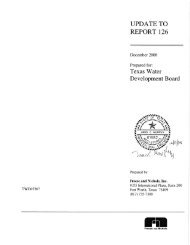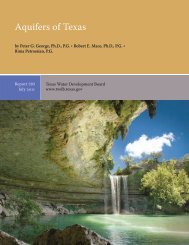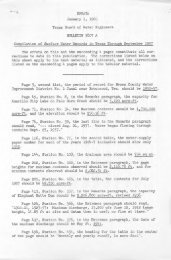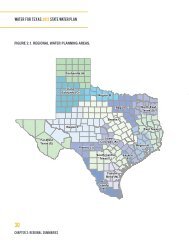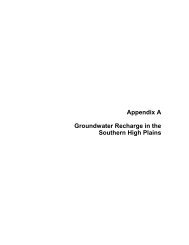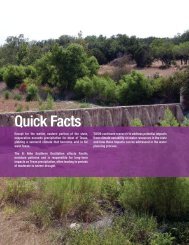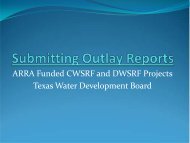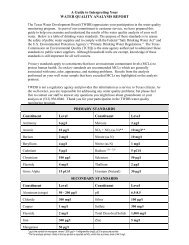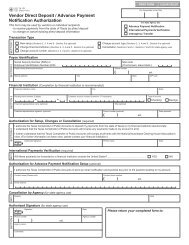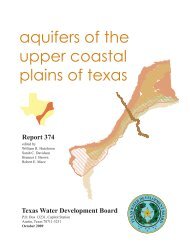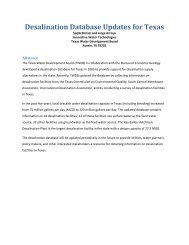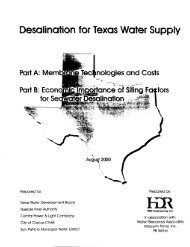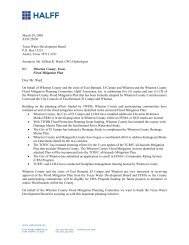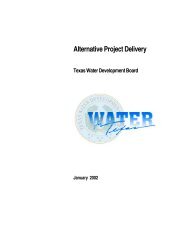(GP/GT) for Additional Water Supply in the Lower Rio Grande
(GP/GT) for Additional Water Supply in the Lower Rio Grande
(GP/GT) for Additional Water Supply in the Lower Rio Grande
Create successful ePaper yourself
Turn your PDF publications into a flip-book with our unique Google optimized e-Paper software.
ill-22<br />
The primary environmental concern of <strong>the</strong> Texas Railroad Commission and <strong>the</strong> TNRCC with respect to<br />
geo<strong>the</strong>rmal development was <strong>the</strong> impact of <strong>the</strong> disposal of hot sal<strong>in</strong>e geo<strong>the</strong>rmal fluids. The Railroad<br />
Commission of Texas (1975) will regulate <strong>the</strong> drill<strong>in</strong>g and operation of geo<strong>the</strong>rmal resource wells and<br />
<strong>the</strong> disposal of fluids from geo<strong>the</strong>rmal resource weIls. Under Rule 8 (A), "Fresh water, whe<strong>the</strong>r above<br />
or below <strong>the</strong> surface, shall be protected from poIlution .... "<br />
(8) The operation of each " ... geo<strong>the</strong>rmal resource well or weIl drilled <strong>for</strong> exploratory purposes<br />
... shall be carried on so that no poIlution of any stream or water course of this state, or any subsurface<br />
waters, will occur as <strong>the</strong> result of <strong>the</strong> escape or release or <strong>in</strong>jection of geo<strong>the</strong>rmal resource or o<strong>the</strong>r<br />
m<strong>in</strong>eralized waters from any weIl."<br />
(C) (1) All operators conduct<strong>in</strong>g" ... geo<strong>the</strong>rmal resources development and production are<br />
prohibited from us<strong>in</strong>g salt water disposal pits <strong>for</strong> storage and evaporation of ... geo<strong>the</strong>rmal resource waters<br />
"<br />
(C) (1) (b) "Impervious-coIlect<strong>in</strong>g pits may be approved <strong>for</strong> use <strong>in</strong> conjunction with approved<br />
salt water disposal operations ... ."<br />
(c) "Discharge of ... geo<strong>the</strong>rmal resource waters <strong>in</strong>to a surface dra<strong>in</strong>age water course,<br />
whe<strong>the</strong>r it be a dry creek, a flow<strong>in</strong>g creek, or a river, except when permitted by <strong>the</strong> Commission is not<br />
an acceptable disposal operation and is prohibited."<br />
(0) (1) "The (weIl) operator shall not pollute <strong>the</strong> waters of <strong>the</strong> Texas offshore and adjacent<br />
estuar<strong>in</strong>e zones (salt water bear<strong>in</strong>g bays, <strong>in</strong>lets, and estuaries) or damage <strong>the</strong> aquatic life <strong>the</strong>re<strong>in</strong>. "<br />
(2) " ... geo<strong>the</strong>rmal resource well drill<strong>in</strong>g and produc<strong>in</strong>g operations shall be conducted <strong>in</strong><br />
such a manner to preclude <strong>the</strong> pollution of <strong>the</strong> waters of <strong>the</strong> Texas offshore and adjacent estuar<strong>in</strong>e zones. "<br />
(a) "The disposal of liquid waste material <strong>in</strong>to <strong>the</strong> Texas offshore and adjacent estuar<strong>in</strong>e<br />
zones shall be limited to salt water and o<strong>the</strong>r materials which have been treated, when necessary, <strong>for</strong> <strong>the</strong><br />
removal of constituents which may be harmful to aquatic life or <strong>in</strong>jurious to life or property."<br />
The Texas Railroad Commission (1975) also regulates <strong>the</strong> <strong>in</strong>jection of sal<strong>in</strong>e water. Under Rule 9 (A),<br />
"Salt water ... unfit <strong>for</strong> domestic, stock, irrigation, or o<strong>the</strong>r general use may be disposed of ... by<br />
<strong>in</strong>jection <strong>in</strong>to <strong>the</strong> foIlow<strong>in</strong>g <strong>for</strong>mations:<br />
(1) "All non-produc<strong>in</strong>g zones of oil, gas or geo<strong>the</strong>rmal resources bear<strong>in</strong>g <strong>for</strong>mations that conta<strong>in</strong><br />
water m<strong>in</strong>eralized by processes of nature to such a degree that <strong>the</strong> water is unfit <strong>for</strong> domestic, stock,<br />
irrigation, or <strong>the</strong>ir general uses."<br />
<strong>Water</strong> quality standards developed orig<strong>in</strong>ally by <strong>the</strong> Texas <strong>Water</strong> Quality Board· were approved by <strong>the</strong><br />
Environmental Protection Agency <strong>in</strong> October 1973 and were amended <strong>in</strong> 1975 (Texas <strong>Water</strong> Quality<br />
Board, 1975). These standards are <strong>in</strong> compliance with <strong>the</strong> Federal <strong>Water</strong> PoIlution Control Act<br />
Amendments of 1972 (p.L. 92-500, U.S. Congress, 1973). Under <strong>the</strong>se standards, "it is <strong>the</strong> policy of<br />
<strong>the</strong> state ... to ma<strong>in</strong>ta<strong>in</strong> <strong>the</strong> quality of water <strong>in</strong> <strong>the</strong> state consistent with <strong>the</strong> public health and<br />
• NowTNRCC



